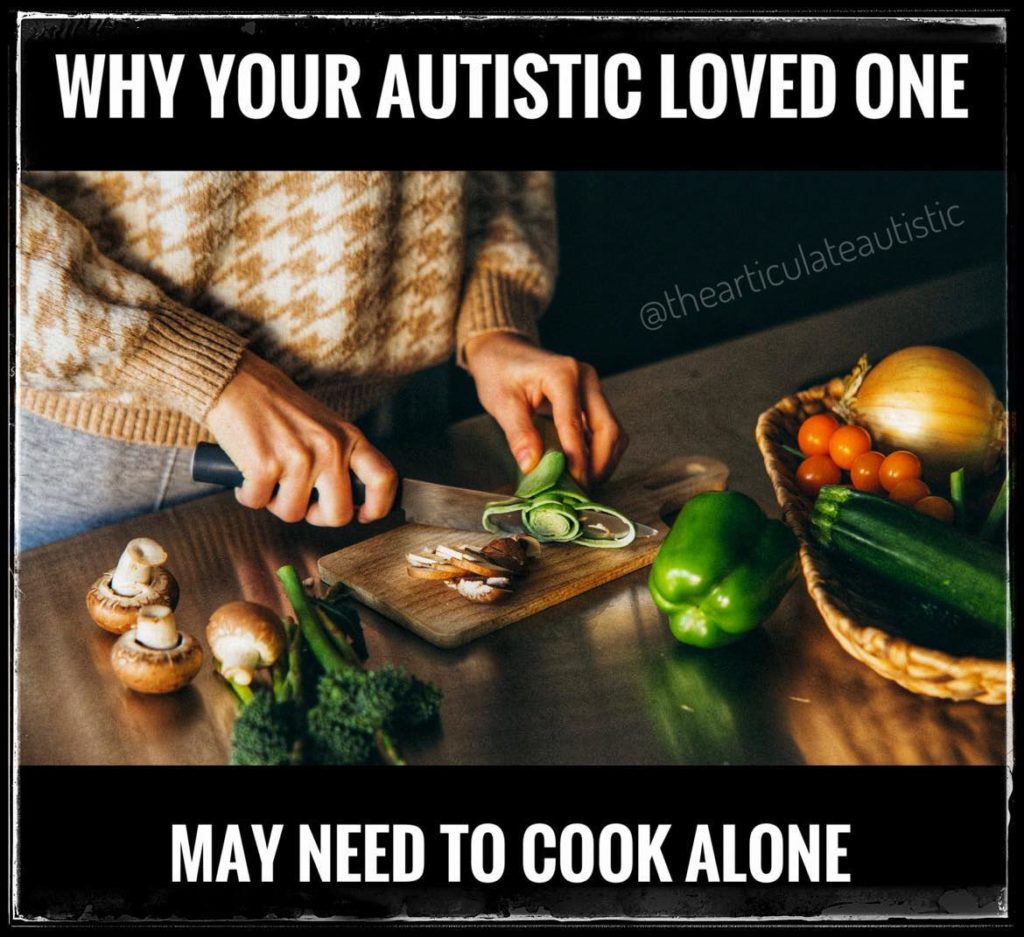Why Your Autistic Loved One May Need to Cook Alone

Have you noticed that when you enter the kitchen while your autistic loved one is cooking, they seem anxious, distracted, or irritable? Do they appear to ignore you? Does it upset you that they appear uninterested in spending time with you, accepting your help, or delegating cooking tasks to you?
This is actually down to a difference in neurology, not a lack of interest in connecting with you. If you’re having difficulty understanding your autistic loved one’s reactions to your presence while they’re cooking, what I’m about to explain could shed some light on their point of view.
While this won’t apply to all autistic people, here are some reasons your autistic loved one may need to cook alone:
Distractions and Interruptions
Being distracted or interrupted when I’m cooking, even a simple dish, can spell disaster. Unlike non-autistic people, whose brains seem to automatically filter out extraneous stimuli while sequencing mental steps, and effortlessly moving their bodies, I have to manually concentrate on doing these things. This means I have to put every ounce of my energy and mental focus toward the food preparation task at hand, or I’ll risk cutting myself, tripping, burning myself, or missing an ingredient or step in the process.
Working Memory
Both my working memory and my short-term memory are terrible. Thus, in addition to having to focus on manually filtering out sensory stimuli, I have to read and re-read instructions multiple times, sometimes needing to repeat those instructions back to myself as I do the task. If someone comes in to talk to me, my already-tenuous grasp on what I’m doing is snapped like a rubber band, and I become disoriented.
Coordination
Like many autistic people, I have poor proprioception (proprioception being the ability to know where my body is in space and relation to other objects). Just in everyday life, it takes nothing for me to trip, slip, run my fingers into a wall when walking from one room to the next, or clip an object with my hand while reaching for another object behind it.
My coordination is terrible, and that’s just when I’m moving around, never mind trying to concentrate on sequential tasks like cooking!
Interruptions, whether sudden or expected can lead to me accidentally cutting my finger, burning myself, or dropping a glass jar because I’ve missed the counter by half an inch when setting it down.
Anxiety
Anxiety can also play a large role in why your autistic loved one needs to cook alone. We may prepare food in a different way than you believe is “correct”, or you think you can show us an “easier” way, but it won’t be easier for us because the steps we’ve practiced are the steps we’ve memorized, and they are embedded into our mental map.
Moreover, we may have been yelled at or teased because of the way we do things, how many times we need to refer back to instructions, or mistakes we’ve made in the past.
Furthermore, many autistic people can go from appearing to be masters of a task to looking like clumsy beginners if anyone is watching them.
Slower Processing Speed
In addition to memory challenges and anxiety, your autistic loved one may also have a slower auditory or visual processing speed. So, for example, when you try to show them how to make Grandma’s Famous Meatloaf, they may not be able to process your instructions fast enough, or they may make mistakes on tasks you consider “easy”. When you get frustrated or angry with them, or when you accuse them of being “willfully obtuse”, what you envisioned to be a fun family bonding experience can quickly turn into a nightmare on our end.
Sensory Differences
The only way I can cook is to be alone in the kitchen while listening to podcasts, music, or white noise. In other words, the only way I can cook (and do other household chores) is by drowning out other sensory stimuli, especially anything that might startle me and/or disrupt my concentration.
Listening to something predictable that doesn’t expect me to provide reciprocal feedback works to focus my mind while also helping get me into a rhythm that makes preparing a meal an easier and more streamlined process for my neurology.
When someone talks to me during meal preparation, especially if they expect well-thought-out responses complete with head nodding, smiling, open body language, and a friendly vocal tone, all of this takes so much manual concentration, I can damn near forget how to butter bread.
The Takeaway
If your autistic loved one has the age, ability, and experience to cook alone, let them do it. If you’re teaching your autistic loved one to cook, be clear and concise in your instructions, answer all questions, and only talk about the task at hand while learning is taking place to avoid unnecessary confusion, derailed concentration, and depletion of mental energy.
Download a PDF of this article on Patreon by clicking here.




Aw, dang. In the closing days of our relationship, I (autistic) and my then-bf (probably autistic) tried to cook together as a couples activity, and at first it was a disaster that ended up with us screaming at each other all the time.
I felt hugely stressed at the whole thing and took his well-meaning suggestions/warnings as snarky criticism that sent me over the edge, and he appeared to feel similarly.
We still wanted to cook together, though, and what we finally arrived at was a clear division of labour: one of us is the Chef, who faces the stove and is In Charge, and the other one is the Sous-Chef who does what the Chef tells him (usually chopping veg) and shuts his trap. (We alternated roles, of course!)
This ended up working well and made the whole thing less tense. The Chef can work without bracing for criticism, and the Sous-Chef doesn’t have to take responsibility for things and stress about them.